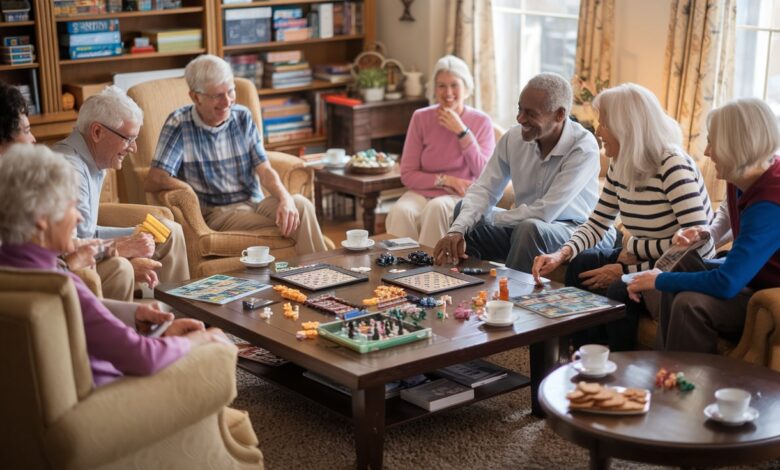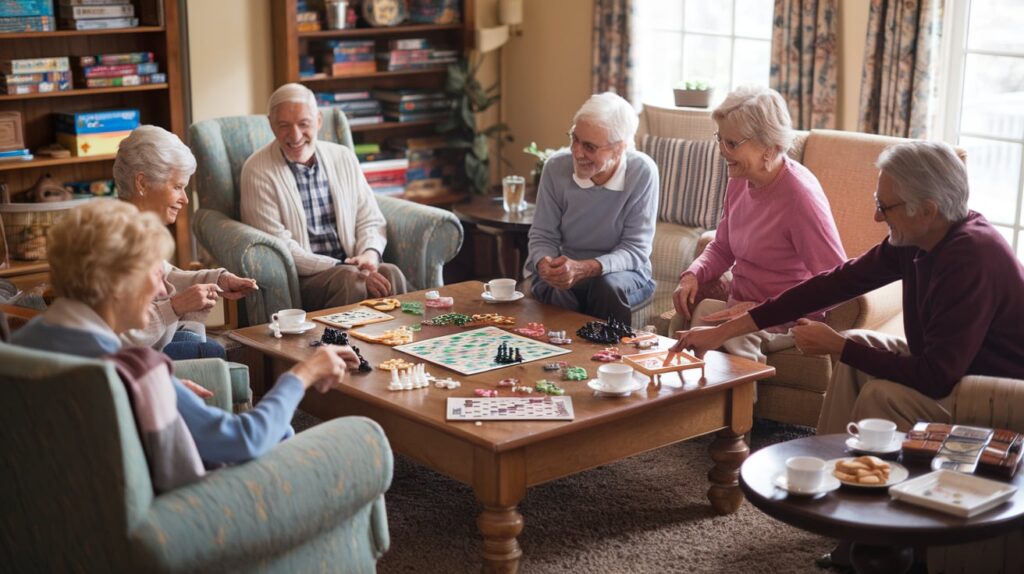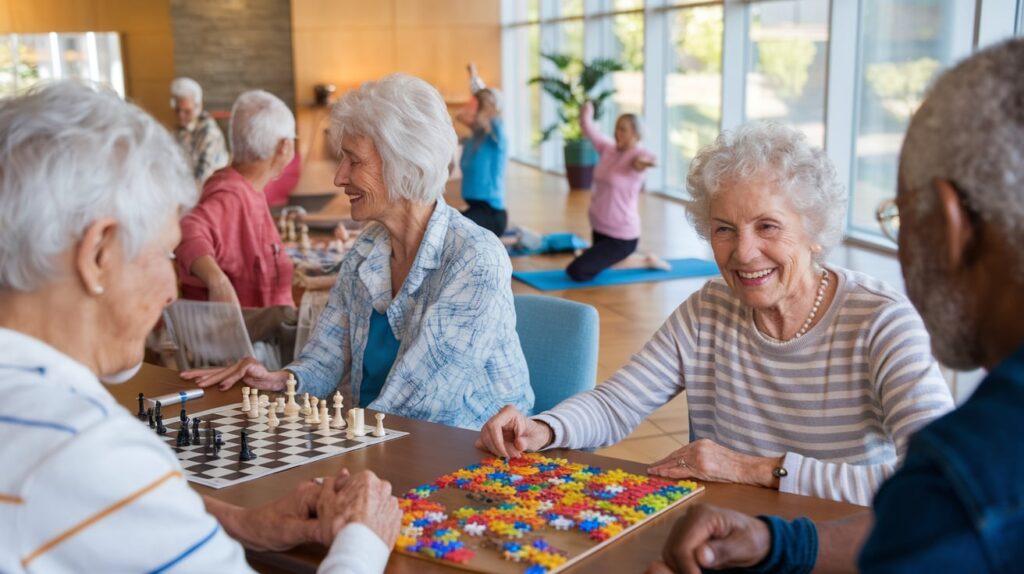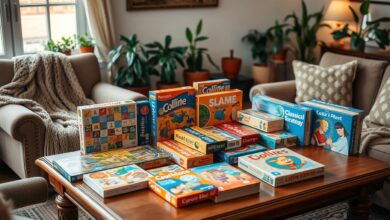Fun Board Games for Seniors: Boost Memory & Joy

Engaging in brain-stimulating board games can be a powerful way for seniors to keep their minds sharp, enhance their well-being, and have fun. Board games for seniors are widely available at various senior living communities, offering a wealth of benefits. Playing these games can help strengthen cognitive connections, improve overall brain function, promote social interaction, boost confidence and independence, and enhance emotional well-being.
Whether you’re a senior yourself or caring for a loved one, incorporating board games into your daily routine can be a delightful and rewarding experience. From classic strategy games to memory-boosting puzzles, the right games can provide the mental stimulation and social engagement that seniors crave. Discover the joy and cognitive benefits of board games for seniors in this comprehensive guide.
Table of Contents
Benefits of Playing Board Games for Seniors
Engaging in cognitive stimulating activities, such as playing board games, can provide a wealth of benefits for seniors. From boosting memory retention to enhancing social engagement, these fun and interactive pastimes offer a multitude of advantages for older adults.
Cognitive Stimulation
Board games require problem-solving, strategic thinking, and memory skills, all of which help seniors strengthen their cognitive abilities and improve overall brain function. Studies show that elderly individuals who regularly engage in mentally stimulating activities like board games can experience less cognitive decline and maintain sharper cognitive abilities well into their 70s.
Social Engagement
Playing board games with friends, family, or in a group setting can combat loneliness and isolation, common challenges faced by many seniors. The social interaction and sense of accomplishment from successfully completing a game can boost self-confidence and provide a much-needed emotional boost. Research suggests that consistent social activities, such as game clubs, can significantly improve quality of life and overall well-being for older adults.
In addition to the cognitive and social benefits, board games can also elevate mood, reduce stress, and trigger the release of endorphins, leading to improved physical health and emotional resilience. By incorporating these engaging and enjoyable activities into their routines, seniors can experience a renewed sense of purpose, joy, and independence.
Classic Board Games for Seniors
Seniors can find tremendous joy and cognitive stimulation in playing classic board games like chess and Scrabble. These timeless games not only provide hours of entertainment but also offer unique benefits that cater to the needs and abilities of older adults.
Chess: Strategic Thinking and Decision Making
Chess is a game that challenges players to think critically and make strategic decisions. For seniors, engaging in a game of chess can help sharpen their strategic thinking, problem-solving skills, and decision-making abilities. The complex nature of the game requires players to anticipate their opponent’s moves, weigh various options, and make calculated choices, all of which contribute to maintaining cognitive function in older adults.
Scrabble: Enhancing Vocabulary and Linguistic Skills
Another classic board game that is highly beneficial for seniors is Scrabble. This word game encourages players to expand their vocabulary, improve their spelling and linguistic skills, and stimulate their cognitive abilities. As seniors engage in Scrabble, they exercise their brains by searching for creative word combinations, recalling words, and strategizing their tile placements.
| Game | Key Benefits for Seniors |
|---|---|
| Chess | Strategic thinking, decision-making, problem-solving |
| Scrabble | Vocabulary enhancement, linguistic skills, cognitive stimulation |
By incorporating these classic board games into their leisure activities, seniors can maintain their cognitive abilities, enjoy social interaction, and experience the inherent joy of friendly competition.
board games for seniors
Board games offer a wealth of benefits for seniors, catering to diverse interests and cognitive skills. From classic games like chess, Scrabble, and checkers to modern favorites like Trivial Pursuit and jigsaw puzzles, these activities can help improve strategic thinking, problem-solving, and visual-spatial skills. The National Institutes of Health recommends board games as a way to fight dementia, with studies showing that engaging in such stimulating cognitive activities can delay the onset of the condition by up to five years.
Board games are also highly accessible for seniors, as they are generally played while sitting down, making them suitable for those with limited mobility. Additionally, games that involve social interaction, such as Rummikub, Uno, and Bridge, can provide a valuable opportunity for seniors to connect with others and combat isolation, which is closely linked to a 40% decrease in dementia risk.

| Board Game | Key Benefits |
|---|---|
| Ticket to Ride | Develops strategic planning and logical thinking |
| Suspend | Enhances hand-eye coordination and fine motor skills |
| Incan Gold | Fosters quick decision-making and risk management |
| Qwirkle | Sharpens pattern recognition and mathematical skills |
| Apples to Apples | Promotes social interaction and creative thinking |
The benefits of board games for seniors are clear, with countless options available to stimulate the mind, foster connections, and maintain cognitive function as individuals age. Whether classic or modern, board games offer a fun and engaging way for seniors to stay mentally sharp and socially engaged.
Easy-to-Learn Card Games
While board games can be a delightful pastime for seniors, card games also offer a fun and engaging option. Easy-to-learn card games like Rummikub and Uno can be a great way for older adults to exercise their numerical skills, strategic thinking, quick decision-making, and social interaction.
Rummikub: Numerical Skills and Strategic Thinking
Rummikub is a tile-based game that combines elements of rummy and mahjong. Players try to form sets and sequences using numbered tiles, challenging their numerical abilities and strategic planning. This game can be enjoyed in small groups, promoting social connection and cognitive stimulation among seniors.
Uno: Quick Thinking and Decision Making
Uno, a classic color-matching card game, is another excellent choice for older adults. It requires quick thinking, fast reflexes, and sound decision-making as players discard their cards. The simple yet engaging gameplay makes Uno a favorite among seniors, fostering laughter and camaraderie during game nights.
These easy-to-learn card games offer seniors an opportunity to exercise their minds, connect with others, and have fun. Whether it’s the numeric skills of Rummikub or the fast-paced excitement of Uno, card games can be a delightful addition to the recreational activities enjoyed by older adults.
Mind Puzzles and Logic Games
Mind puzzles and logic games, such as Sudoku, can provide a great mental workout for seniors. Sudoku challenges logical reasoning and attention to detail, helping to keep the mind active and engaged. These types of games can be particularly beneficial for seniors, as they require problem-solving skills and focus, which are essential for maintaining cognitive function.
Sudoku: Logical Reasoning and Attention to Detail
Sudoku is a classic logic game that has gained immense popularity among seniors. This grid-based puzzle requires players to fill in a 9×9 grid with digits from 1 to 9, ensuring that each row, column, and 3×3 sub-grid contains all the digits without repetition. Solving Sudoku puzzles engages the brain’s logical reasoning and attention to detail, providing a mental workout that can help seniors maintain their cognitive abilities.
- Sudoku enhances logical thinking and problem-solving skills
- The game requires focused attention and concentration, improving focus
- Solving Sudoku puzzles can boost memory and spatial awareness
- Playing Sudoku regularly can help delay the onset of cognitive decline
In addition to Sudoku, there are numerous other mind puzzles for seniors and logic games for seniors that can provide cognitive stimulation and mental engagement. Games like Logic Balls, Tricky Blocks, Tangram Puzzles, and Have I Seen It or Not challenge reasoning, visualization, and memory skills, while activities like Messy Room, Spot the Difference, and Rotate Shapes enhance attention, visual tracking, and comparison abilities.
By incorporating a variety of mind puzzles and logic games into their routines, seniors can enjoy a fun and engaging way to keep their minds sharp and maintain their cognitive function as they age.
Board Games for Seniors with Dementia
Board games can be a valuable tool for seniors living with dementia. These games not only provide mental stimulation, but also promote social interaction and a sense of accomplishment. With over 6 million Americans living with Alzheimer’s, the most common form of dementia, specialized board games have been designed to cater to the unique needs of this population.
Some popular board games for seniors with dementia include Memory Activity Balls, Call to Mind, Qwirkle, Bingo, Memory Lane, Snakes and Ladders, Ludo, and Connect 4. These games are designed to stimulate cognitive function, combat loneliness, and boost self-esteem and mood.

The Call to Mind board game, for instance, is a social and memory-based game that has been developed over 20 years through research and testing, including accreditation by UCL. Priced at $49.95, the game features a gameboard, spinner, 200 question cards, instructions, and feedback sheets. It is recommended for 45-minute games and has an average rating of 5 out of 5 stars based on 17 reviews.
According to a 2010 Boston University study, Alzheimer’s patients were found to be more likely to remember lyrics on memory tests compared to learning spoken messages. This suggests that activities involving music, such as singing along to familiar songs, can also be beneficial for seniors with dementia.
In addition to board games, other activities like gardening, moderate aerobic exercise, and adult coloring books have been shown to provide therapeutic benefits for seniors with dementia. These activities can help reduce stress, stimulate the brain, and promote social engagement.
Ultimately, board games can be a valuable tool in the care and support of seniors with dementia, providing cognitive stimulation, social interaction, and a sense of accomplishment that can improve their overall well-being.
Tailored Games for Low Vision or Large Print
For seniors with low vision or other physical limitations, there are tailored board games for seniors with low vision and large print board games for seniors available with accessibility features. These adaptations ensure that older adults can continue to enjoy games and activities that stimulate their minds and provide social engagement, despite any visual or dexterity challenges they may face.
Games like No Thanks, Santorini, and Nyctophobia incorporate strategies to accommodate players with visual impairments. These adaptations may include large-print text, high-contrast visuals, tactile enhancements, and gameplay that relies less on color differentiation.
Cooperative games, such as Forbidden Island, also offer inclusive experiences for seniors with low vision. These games feature clear iconography and intuitive gameplay, making them accessible for players with diverse abilities.
Beyond physical board games, there are also digital and virtual options that cater to the needs of seniors with low vision. These include large-print playing cards, oversized game pieces, and assistive technology features to enhance the gaming experience.
By embracing inclusive game design and accessibility, the board game industry is promoting diversity and ensuring that seniors with low vision or other limitations can fully engage in the joy and benefits of gameplay.
Intergenerational Games for Family Fun
Board games can be a wonderful way to bring together multiple generations and foster connections between seniors and their younger family members. Playing games as a family promotes social interaction, communication, and shared experiences, allowing older adults to bond with their loved ones while exercising their cognitive abilities. The opportunity to teach younger generations classic intergenerational board games or learn new ones can be a rewarding and enriching experience for family board games for seniors.
Connecting Generations Through Play
Engaging in intergenerational board games can bridge the gap between seniors and their younger family members, creating opportunities for meaningful conversations and shared memories. Older adults can share their wisdom and life experiences, while younger generations can learn from their elders and develop a deeper appreciation for their family history. This exchange of knowledge and perspectives can strengthen familial bonds and foster a sense of belonging across age groups.
- Encourage grandparents to teach classic board games like Chess, Checkers, or Scrabble to their grandchildren, fostering intergenerational interaction and skill-sharing.
- Discover new family board games for seniors that cater to both older and younger players, such as cooperative or dexterity-based games that require teamwork and communication.
- Incorporate board game nights into your family traditions, where everyone from children to grandparents can participate and enjoy quality time together.
By embracing the joy of playing board games as a family, seniors can create lasting memories, maintain cognitive stimulation, and deepen their connections with loved ones of all ages. These intergenerational board games offer a unique opportunity to bridge the generational divide and cultivate a stronger, more united family dynamic.
Virtual and Digital Board Games
In today’s digital age, seniors can also enjoy a wide variety of virtual and digital board games. These digital board games for seniors and virtual board games for seniors offer cognitive stimulation, social engagement, and a sense of adventure, all from the comfort of home. Platforms like tablets, smartphones, and computers provide access to classic games as well as specialized brain training apps, allowing older adults to stay mentally active and connected with friends and family members near and far.
One study found a 47.9% potential protection against cognitive decline and dementia through board game engagement in a French population-based cohort. Additionally, research has shown a 9% increase in cognitive control observed in older adults through video game training, emphasizing the benefits of digital board games for seniors in enhancing cognitive abilities.
The popularity of online and mobile games has surged during the COVID-19 pandemic, with a 76% of senior gamers expressing preferences, motivations, and specific needs in gaming. This reflects a significant and growing segment of the gaming population that is eager to engage with virtual board games for seniors.
From classic games like Guess Who? to specialized brain training apps, the digital realm offers a wealth of opportunities for seniors to exercise their minds, connect with loved ones, and experience the joy of gameplay. With a 3% boost in memory linked to engaging in fun board games for seniors, these digital board games for seniors can be a valuable tool in promoting cognitive health and overall well-being.
Choosing Age-Appropriate Games
When selecting board games for seniors, it’s crucial to consider their skill levels, cognitive abilities, and personal interests. Some games may be too complex or challenging, while others may not provide enough mental stimulation. By choosing age-appropriate board games for seniors that cater to their preferences and capabilities, seniors can fully engage in the activity and derive the maximum cognitive and social benefits.
Assessing Skill Levels and Interests
To ensure seniors enjoy the gaming experience, it’s essential to evaluate their skill levels and interests. Consider the following factors when choosing board games for seniors:
- Cognitive abilities: Opt for games that stimulate strategic thinking, problem-solving, and memory, such as chess, Scrabble, or Sudoku.
- Dexterity and motor skills: Choose games with simple mechanics and larger pieces for seniors with limited mobility or vision.
- Personal preferences: Tailor the game selection to seniors’ hobbies and interests, whether it’s classic card games, trivia, or outdoor activities.
By matching the game’s complexity and features to the senior’s skills and interests, you can ensure they have an engaging and enjoyable gaming experience.
| Game Type | Benefits for Seniors | Examples |
|---|---|---|
| Cognitive Stimulation | Promotes strategic thinking, problem-solving, and memory | Chess, Scrabble, Sudoku |
| Dexterity and Motor Skills | Suitable for seniors with limited mobility or vision | Classic card games, dominos, Checkers |
| Personal Preferences | Caters to seniors’ hobbies and interests | Trivia games, outdoor activities, puzzles |
By considering these factors, you can choose age-appropriate board games for seniors that provide the right balance of challenge, enjoyment, and cognitive stimulation.

Setting Up a Game Night
Creating a regular senior game night can be a wonderful way for older adults to stay socially connected and mentally engaged. Whether it’s hosting a board game night for seniors at home with friends and family or participating in organized events at a community center or senior living facility, these gatherings provide an opportunity for seniors to enjoy beloved board games, foster new friendships, and maintain a sense of purpose and enjoyment in their lives.
To set up a successful senior game night, consider the following tips:
- Select a comfortable and accessible venue, such as a community center, senior center, or even a private home with ample seating and space for the games.
- Curate a variety of classic and easy-to-learn board games, card games, and puzzles that cater to a range of skill levels and interests. Some popular choices include Monopoly, Scrabble, Rummikub, and Sudoku.
- Encourage participation by providing clear instructions and adaptations for games, ensuring that all seniors can engage and enjoy the activities.
- Create a welcoming and inclusive atmosphere by promoting social interaction, fostering friendly competition, and providing refreshments to create a comfortable and enjoyable experience.
| Game | Benefits for Seniors | Suggested Adaptations |
|---|---|---|
| Monopoly | Enhances critical thinking and money management skills | Use larger print game boards and cards, provide assistive devices for handling money and game pieces |
| Scrabble | Improves vocabulary and spelling skills, stimulating cognitive function | Offer dictionary assistance, larger letter tiles, and magnifiers for low vision players |
| Bingo | Simple and exciting, suitable for larger groups of seniors | Use large-print bingo cards and provide markers or assistive devices for easy marking |
By creating a regular senior game night, you can foster social connections, cognitive stimulation, and a sense of joy and purpose among older adults, helping them to thrive and enjoy their golden years.
Conclusion
Playing board games is a powerful tool for enhancing the overall well-being of seniors. These engaging activities not only provide cognitive stimulation but also foster social connections and a sense of accomplishment. By incorporating a diverse array of board games, card games, puzzles, and digital brain exercises into their daily routines, older adults can unlock the remarkable benefits of brain games.
The research evidence clearly demonstrates the advantages of board game play for seniors. From improving educational knowledge and cognitive functions to reducing the risk of dementia and depression, the positive impact of these games is undeniable. Seniors who regularly engage in board game activities exhibit better maintenance of their mental faculties, stronger social ties, and an enhanced quality of life.
Whether you’re a senior seeking to maintain your mental sharpness, or a caregiver looking to enrich the lives of your older loved ones, incorporating board games into your daily routine is a simple yet highly effective strategy. By embracing the power of brain games, seniors can embark on a journey of lifelong learning, social engagement, and personal growth, all while experiencing the joy and fulfillment that come from mastering new skills and challenging the mind.
FAQ
What are the benefits of playing board games for seniors?
Engaging in brain games can help seniors strengthen their cognitive connections, improve overall brain function, promote social interaction, boost confidence and independence, and improve emotional well-being.
What are some classic board games that are great for seniors?
Classic board games like chess, Scrabble, checkers, Trivial Pursuit, and jigsaw puzzles can provide significant benefits for seniors by improving strategic thinking, problem-solving, and linguistic skills.
What types of card games are suitable for seniors?
Easy-to-learn card games like Rummikub and Uno can help improve numerical skills, strategic thinking, quick thinking, and decision-making abilities for seniors, while also fostering social interaction.
How can board games benefit seniors with dementia?
Board games designed for seniors with dementia, such as Memory Activity Balls, Call to Mind, Qwirkle, Bingo, Memory Lane, Snakes and Ladders, Ludo, and Connect 4, can help slow the progression of dementia, combat loneliness and isolation, and boost self-esteem and mood.
Are there board games and card games with accessibility features for seniors with low vision or physical limitations?
Yes, there are tailored board games and card games available with large print or other accessibility features to ensure older adults with visual or dexterity challenges can continue to enjoy cognitive stimulation and social engagement.
How can intergenerational board games benefit seniors?
Playing board games with younger family members can promote social interaction, communication, and shared experiences, allowing older adults to bond with their loved ones while exercising their cognitive abilities.
What should be considered when choosing board games for seniors?
When selecting board games for seniors, it’s important to consider their skill levels, cognitive abilities, and personal interests to ensure the games provide the right level of mental stimulation and challenge.
How can seniors incorporate regular game nights into their routine?
Creating a regular game night, whether at home with friends and family or through organized events at a community center or senior living facility, provides an opportunity for older adults to enjoy beloved board games, foster new friendships, and maintain a sense of purpose and enjoyment in their lives.




